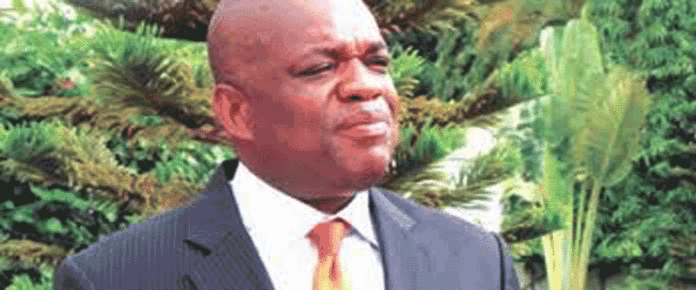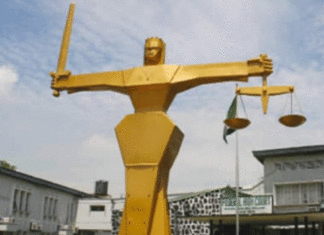By Onyewuchi Ojinnaka
The trial of former Abia State governor Dr Orji Uzor Kalu and two others charged along with him by the Economic and Financial Crimes Commission (EFCC) on Thursday suffered a setback as a Federal High Court sitting at Ikoyi, Lagos State, Nigeria, adjourned the trial sine die (indefinitely), because the fiat given to the trial judge, Justice Mohammed Idris, will elapse on Friday (tomorrow), being the last working day of September which ends on Sunday.
Orji Kalu was expected to open his defence on Thursday following the bench ruling of the court on Wednesday which granted him the last adjournment on the matter.
However, at the resumed hearing of the matter, the trial judge Justice Mohammed Idris (now elevated to the Court of Appeal) informed lawyers and other litigants present in court that since it was clear that the fiat given to him by President of the Court of Appeal to adjudicate on the case will elapse by the ending of this month (September), it will be of no use for him to continue with a case that he will not be able to complete.
Following this information, Justice Idris thereafter announced the indefinite adjournment of the matter to enable him resume fully at the Appellate Court, adding that the case file will be sent back to the Chief Judge of the Federal High Court.
It would be recalled that Justice Idris had on Wednesday asked the defendants to open their defence in the N7.1 billion money laundering charge preferred against them by the Economic and Financial Crimes Commission, having declined to uphold the arguement of Chief Mike Ozekhome on the issue of jurisdiction.
The anti-graft agency had charged Orji Uzor Kalu alongside his finance commissioner Udeh Jones Udeogu and his (Kalu’s) firm, Slok Nigeria Limited over alleged money laundering to the tune of N7.1 billion.
They had pleaded not guilty to the charge and were granted bail.
Last Wednesday, the court entertained application from the defence which questioned the jurisdiction of the court to continue with the criminal charge. Justice Idris had in his ruling held that he would resist the temptation of delving into issues which were already filed on Appeal.
The trial judge posited that although the issues raised by the defence counsel were recondite, he would however apply caution in his ruling.
Justice Idris had said, “I have listened to the learned senior counsel and again the issues raised are live issues already before the learned law lords of the Court of Appeal.
“Being already before the appellate court, it cannot be a live issue in this court; I shall exercise caution so as not to make comments on issues to be determined by the appellate court.
“Trial shall proceed.”
Prior to the ruling of Justice Idris, Mike Ozekhome (SAN) who appeared for the first defendant (Uzor Kalu) had posited that his motion was brought pursuant to the 1999 Constitution as amended.
He argued that his four-ground application is questioning the constitutionality of Justice Idris to continue to adjudicate on the matter having been elevated to the Court of Appeal.
According to Ozekhome, “This Judex, having been elevated as a Court of Appeal judge, cannot continue to sit as a Federal High Court Judge to try this charge; it is illegal, unlawful and unconstitutional.”
Ozekhome drew the attention of Justice Idris to the provisions of Sections 238, 239, 240, 252 and 253 of the Constitution, just as he insisted that the provisions makes it clear, “That the Court of Appeal which is peopled by justices such as my lord, cannot sit as a court of first instance but only on Appeal.”
Moreover, the silk counsel contended that where the court is indisposed to granting the application to recuse itself, then, the court should be gracious enough to afford the accused a time frame for medical travel overseas.
While responding, counsel to the EFCC, Rotimi Jacobs (SAN) maintained that the application filed by the defence remained a ploy to stall the case which he argued had lingered for so long.
He urged the judge to throw out the application and direct the defendants to open their defence.
Jacobs added that a fiat had already been issued for the judge to continue with the trial which is already at its concluding stage.
The EFCC counsel further argued that the said fiat was sought for and obtained by the defence, adding that it would be unfair for the defence to do a turn around at this point.
Meanwhile, the applications before the Lagos division of the Court of Appeal, other defendants,Udeh Jones Udeogu and Slok Nigeria Limited, through their counsel, Solo Akuma (SAN) and K. C. Nwofor (SAN), had asked for stay of further proceedings by Justice Idris on the matter pending the hearing and determination of separate motions they filed at the Lagos and Abuja Divisions of the Court of Appeal.
In his submissions, Udeogu’s lawyer, Akuma (SAN) drew the court’s attention to a motion he filed at the Abuja division of the Court of Appeal challenging the transfer of the case to the Lagos division of the Federal High Court.
He said appellants’ briefs had already been filed in the matter which has been entered and marked as; CA/A/870/2017.
Akuma added that he had also lodged an appeal against the dismissal of his client’s no- case submission at the Lagos Division of the Court of Appeal.
“Records have also been compiled in the appeal and it has also been transmitted on 13th August.
“There is also an application for stay of proceedings in the same appeal.
“Hearing on the appeal has been fixed for October 4,” Akuma said.
While urging the court to stay further proceedings on the matter, Akuma argued that going ahead with its hearing will pre-judge the application at the Court of Appeal.
Addressing the court, Slok’s lawyer, Nwofor (SAN), also sought for a stay of further proceedings in the matter pending the hearing and final determination of the appeal lodged by his client against the dismissal of his no- case submission.
He added that the grounds of appeal also questioned the jurisdiction of the lower court to continue with the hearing of the matter following the elevation of Justice Idris to the Court of Appeal.
“Order 4 Rules 10 and 11 of the Court of Appeal Rules has a constitutional flavour that is superior to the provisions of Section 396 (7) of the Administration of Criminal Justice Act (ACJA) 2015 which permits my lord to sit as a High Court judge”, he said.
Responding, EFCC’s lawyer, Jacobs (SAN), expressed his opposition to the two defence lawyers’ request for a stay of proceedings in the matter.
“The points raised by the two defence lawyers were no longer life issues as they have been overtaken by the advent of ACJA.
“Section 306 of ACJA frowns at any application for stay of proceedings in criminal matters.
“We urge the court to refuse the application for stay of proceedings as it is no longer permissible under the law”, he said.
In a Bench ruling, Justice Idris had declined to stay further proceedings on the matter, saying it is in conflict with the law.
According to Justice Idris, “The application is in conflict with the law. Trial is being conducted under the ACJA which requires day-to-day proceedings.
“Learned counsels can proceed to the Appellate Court for the hearing of the application for stay and I will be bound by whatever is the outcome”.













